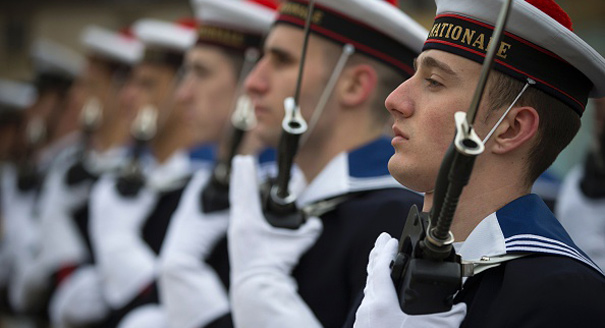A recent conversation with a European defense industry representative quickly turned to the difficulty of defining common military requirements among EU countries and thus of developing common defense procurement programs. Many Brussels-bubble defense geeks, myself included, believed the global financial crisis would lead to more defense cooperation. We were wrong. The people writing the requirements for national militaries—recent additions to defense staffs, usually fresh from operational duty—have been trained and promoted in largely national settings.
The upshot is that you can’t drill national superiority into someone’s head and then expect that person to embrace international cooperation and compromise. A soldier’s mission is to serve his or her country above all else. But if European armed forces can be convinced to fight for Europe, so might European citizens.
Pessimism is the new black in Brussels, and an EU army may still be decades away, despite several recent calls to this end. Yet one practical idea could be to jointly train European recruits. Common training would strengthen the EU’s clout as a serious security player and therefore boost the credibility of European foreign policy.
EU military and police training missions abroad have had mitigated success, but intra-EU bilateral military exchanges have worked well. Joint training could expand young recruits’ horizons: imagine an Italian recruit training in the high North or a Finnish cadet training in Cyprus.
By making parts of national training programs European, the EU would keep the diversity that makes it strong while promoting the cross-fertilization of ideas vital to its survival, without infringing on national sovereignty. Beyond the symbolic message of unity, common core training would build a European esprit de corps, contribute to a strengthened European identity, and firmly anchor the European values that are currently under attack from populist political parties. Common standards on human rights and on gender and ethnic equality could be built into the curriculum.
Common European military training could facilitate the deployment of military missions as servicemen and ‑women become used to working with their European counterparts. A common training course could do wonders for civil-military cooperation by teaching recruits about the sensitivities of working alongside NGOson the ground. Such an approach could also bolster the specific skills needed for peacekeeping missions and clarify that armed forces’ ultimate goal is peace, bridging the ideological gap between warmongers and peacemakers.
Joint training would make interoperability a built-in feature of Europe’s armed forces, focusing on the human element in addition to the technical. Harmonizing training and improving European interoperability would in turn facilitate cooperation with NATO or UN-led missions, easing common deployments and reducing reaction times to conflicts.
A common approach would also speed up the modernization of Europe’s armed forces in several ways. By using the best training methods from across member states, it would encourage a race to the top in terms of processes and procedures. European recruits could be introduced to modern capabilities such as cyber- or space-related assets. Common training would boost excellence in teaching, lecturing, and research in the military and strategic fields, improving Europe’s capacity for strategic foresight.
This in turn would do marvels for common procurement, ensuring Europe’s armed forces have the equipment they need to deal with today and tomorrow’s security environment rather than last century’s. Such a bottom-up shared understanding would facilitate common procurement programs better than existing top-down pooling-and-sharing initiatives do. This shift could foster the consolidation of Europe’s defense industry, keeping valuable high-tech jobs in Europe and encouraging innovation and growth in civilian and military industries.
Germany recently floated the idea of opening up its military recruitment to other EU nationals. Should this novel proposal gain traction among other EU member states, common core training could facilitate the process and ultimately let European armed forces compete for the best recruits.
A less radical alternative could be based on France’s Foreign Legion, in spite of the service’s somber colonial past. As migration into Europe continues, EU member states could offer non-EU nationals an opportunity to serve their new homelands, facilitating integration. Common military training could also be linked up to European police training programs, as in France, where gendarmesmay attend the country’s military academy, Saint-Cyr. This interconnectedness could boost the comprehensive, whole-of-government, whole-of-society approach to security that Europe urgently needs from the ground up and improve tactical cooperation.
Such training should not be limited to officers but instead consist of a mandatory year or semester in common European training facilities that bring together the rank and file of the 28 member states’ armed forces. And it should not be conceived in complementarity to national military training programs.
A first step would therefore be to map existing training programs to identify gaps and best practices. Training could be decentralized across member states, making use of existing training grounds or reoccupying abandoned military bases. The transportation of recruits could provide pilots with the training hours they desperately need.
Common basic military training would not just show the world that Europe is serious about its armed forces. It would also demonstrate to Europe’s servicemen and -women that they matter and that despite years of budget cuts, they are part of the European project.
This project is relevant only if Europe believes in its armed forces. Ongoing wars in Syria and Iraq and the positioning of Russian missiles in the Kaliningrad exclave in the Baltic beg the question of whether deterrence remains valid in twenty-first-century international relations. Can President Vladimir Putin’s Russia or the self-proclaimed Islamic State be convinced that the EU could mean business, or would a strengthened EU military apparatus just escalate conflict?
Pauline Massart is deputy director for security and geopolitics at Friends of Europe and vice president for outreach and operations at Women in International Security (WIIS) Brussels.






